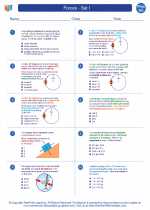Fossil Fuels
Fossil fuels are natural resources that are formed from the remains of living organisms over millions of years. These resources are used to generate energy and power in various applications, including electricity generation, transportation, and heating.
Types of Fossil Fuels
There are three main types of fossil fuels:
- Coal: Formed from the remains of plants that lived in swamps and forests millions of years ago. Coal is mined and burned to generate electricity and heat.
- Oil (Petroleum): Formed from the remains of marine organisms that were buried deep within the Earth's crust. It is refined to produce gasoline, diesel, and other fuels for transportation and heating.
- Natural Gas: Formed from the decay of organic matter deep within the Earth. It is used for heating, cooking, and electricity generation.
Formation of Fossil Fuels
Fossil fuels are formed through a process that involves the following stages:
- Organic Matter Accumulation: Dead plants and animals accumulate in large quantities in swamps, oceans, or other low-oxygen environments.
- Burial and Decomposition: The organic matter is buried by sediment over time, preventing it from fully decomposing due to the lack of oxygen.
- Heat and Pressure: As more and more sediment accumulates, the organic matter is subjected to high levels of heat and pressure, causing it to undergo chemical and physical changes.
- Formation of Fossil Fuels: Over millions of years, the organic matter transforms into coal, oil, or natural gas, depending on the specific conditions present during its formation.
Environmental Impact
While fossil fuels have been a major source of energy for centuries, their use has significant environmental impacts. The combustion of fossil fuels releases carbon dioxide and other greenhouse gases into the atmosphere, contributing to climate change. Additionally, the extraction and combustion of fossil fuels can lead to air and water pollution, as well as habitat destruction.
Study Guide
Here are some key concepts and questions to consider when studying fossil fuels:
- What are the main types of fossil fuels, and how are they used?
- What processes are involved in the formation of fossil fuels?
- What are the environmental impacts of using fossil fuels, and what are the alternatives?
- How does the extraction and combustion of fossil fuels impact natural ecosystems?
- What are the challenges associated with transitioning to renewable energy sources?
[Fossil Fuels] Related Worksheets and Study Guides:
.◂Physics Worksheets and Study Guides High School. Forces - Set I

 Worksheet/Answer key
Worksheet/Answer key
 Worksheet/Answer key
Worksheet/Answer key
 Worksheet/Answer key
Worksheet/Answer key
